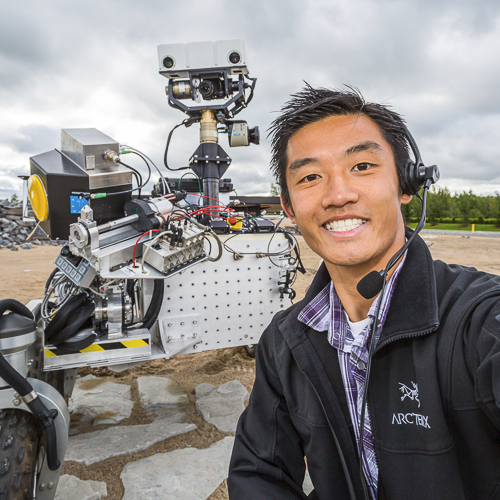About Me
My name is Dorian Tsai, a robotics research engineer. Mechatronics and machine learning have revolutionised operations in well-defined environments, but I am excited to use such technologies to explore unstructured outdoor environments. I want to help pioneer this future by developing next-generation autonomous and perception systems and verifying them in realistic environments. I am particularly interested in aspects of robotic vision, light field imaging technology, deep learning and space and field robotics.
I am currently a project specialist in automation prospecting for the Reef Restoration and Adaptation Project (RRAP), as well as a part-time research fellow in an agricultural robotics project at the Queensland Centre for Robotics. In RRAP, I am looking at research and technological interventions aimed at helping to save the Great Barrier Reef from climate change, and identifying automation opportunities that will enable these developments to scale from several local reefs to the entire Great Barrier Reef. In the agricultural robotics project, I am collaborating with academic and industry partners to automatically detect various weed species for precision pasture and vineyard management using state-of-the-art machine vision and deep learning techniques.
I completed my PhD in robotic vision at the Queensland University of Technology (QUT) in Australia with Peter Corke, Donald Dansereau and Thierry Peynot. I investigated how to develop 4D light field features and how to exploit them for camera motion and vision-based control for robots. I demonstrated improved structure-from-motion performance in scenes with refractive objects, where traditional methods would otherwise fail. This research was performed with the goal of helping robots perceive and take action around transparent objects to ultimately broaden the range of perceivable objects and operable scenes, making robots safer.
My double MSc in Space Science & Technology was from Lulea University of Technology in Sweden, and Msc in Space Robotics from Aalto University in Finland, where I learned a diverse range of topics from space physics, satellite instrumentation, spacecraft dynamics and control, to field robotics and mathematical control theory. I performed my Master’s thesis project at the NASA Jet Propulsion Lab on autonomous vision-based tether-assisted rover docking with Dr. Issa Nesnas (JPL) and Prof. Aarne Halme (Aalto). I received my Bachelor’s of Applied Science in Engineering Science from the University of Toronto, Canada with a major in Aerospace Engineering. I worked as a robotics engineer at the Canadian Space Agency before arriving at QUT for my PhD.
